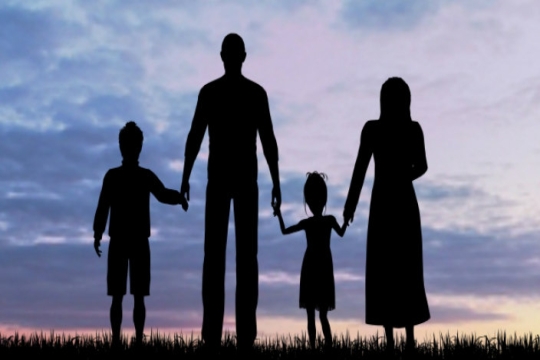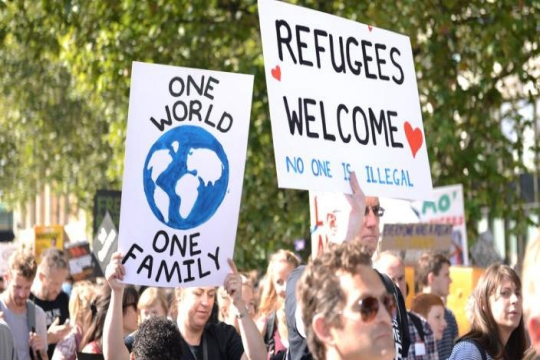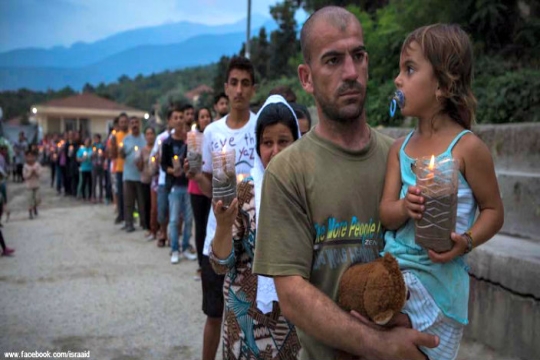
Remember the feeling you had when you got on an airplane alone to study abroad, or when you packed up everything you owned and moved to a new city? All the emotions that might have come up for you - fear, excitement, trepidation -could very well have been Avram’s response to the famous line from the Torah portion of this year’s National Refugee Shabbat, Parashat Lech L'cha:
“Go forth from your native land and from your father’s house to the land that I will show you. I will make of you a great nation, And I will bless you; I will make your name great, And you shall be a blessing” (Genesis 12:1-2).
This injunction from God to Avram sets the Jewish people’s journey into motion, quite literally. Avram heeds God’s call and departs Haran at the age of 75. As we approach National Refugee Shabbat (October 19-20), a time for Jewish communities to deepen their knowledge of and response to the current refugee crisis, we turn to the week’s Torah portion to inspire and inform our observance.
What led Avram to take the leap, to leave his native land and his father’s house? After all, he might not have even known where he was going. As Aviva Zorenberg writes in The Beginning of Desire,
“Ramban considers the possibility that Avram knows from the beginning that his destination is Canaan, since his father began a family journey to that destination...However, the other possibility...is that Avram has no idea of his destination when the call comes to him” (74-5).
I’d like to suggest that, regardless of whether Avram knew where he was going, it is the nature of his encounter with God that launches his journey.
The Sefat Emet, a 19th century Hasidic rabbi, teaches that God uttered the lech l'cha call to all people and at all times, but Avraham was the first to listen. This radical notion suggests that Avram actively chose to hear God and subsequently “went forth as the Lord commanded him” (Genesis 12:4). Avram’s agency is striking. He is not a passive player in God’s master plan, but rather a seeker who heeds a call. Avram might be embarking on an unknown journey, but he does so from a place of choice.
Today, many people who leave their homes do not have the privilege of leaving by choice, but rather out of necessity. We currently face the worst refugee crisis in global history, with over 68.5 million forcibly displaced people, of which 25.4 million are refugees. War, religious persecution, violence, and economic distress serve as impetus for these travelers’ journeys.
From our own history as a migratory people facing persecution to our sacred text’s frequently repeated injunction to treat the ger - the foreigner among us - with compassion, we know how important it is to help refugees. However, those of us who live in the United States too often wake up to new attacks on our country’s refugee resettlement program. On September 17, Secretary of State Mike Pompeo announced the refugee admissions ceiling for 2019, which, at 30,000, is the lowest in our nation’s history. In Canada, many believe that the country’s refugee system, which is facing increasing strain as nations like the U.S. do less, needs restructuring. Considering these developments, we must (re)commit ourselves to welcoming the ger.
Jewish communities across North America will come together for National Refugee Shabbat on October 19-20, 2018, the week we read Parashat Lech L'cha.
This is an opportunity for each of us to deepen our understanding of the refugee crisis and draw inspiration from our Jewish tradition before going back out into the world and taking action. There are many ways to participate in National Refugee Shabbat. Whether you use the day to culminate a week of action, bring in a speaker, run themed services, or have a discussion over dinner, the experience can be tailored to your community. Find resources from HIAS and a list of participating congregations, which you can join.
In the parashah after Lech L'cha, we find the newly renamed Avraham sitting outside his tent when three strangers appear. Avraham does not just go to greet the strangers, he literally runs towards them. This National Refugee Shabbat, may we live out Avraham’s legacy, running towards God’s unique call to each of us and embracing refugees.
Learn more about the work of the Religious Action Center of Reform Judaism at www.rac.org.
Related Posts

How Our Temple is Supporting a Refugee Couple - and What You Can Do to Help

Let Us Welcome, Not Fear, the Stranger


